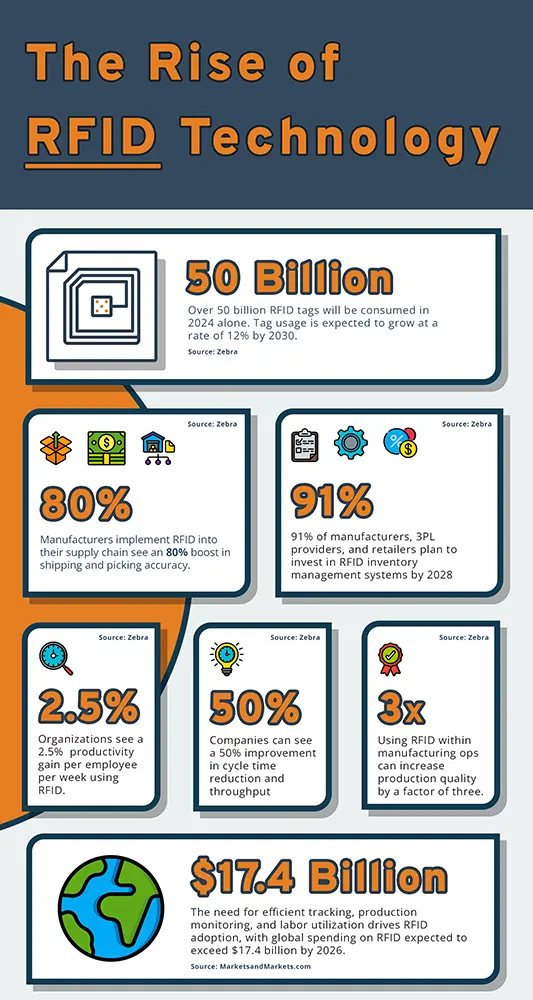Radio Frequency Identification (RFID) technology is rapidly transforming various industries by providing real-time tracking and management of assets. From retail and manufacturing to healthcare and warehousing, RFID’s ability to enhance efficiency, reduce costs, and improve accuracy has made it a critical tool in modern operations.
RFID in Retail: Revolutionizing Inventory Management
The retail industry has seen a significant shift with the adoption of RFID technology. Leading the charge is Walmart, which recently mandated that its top suppliers implement RFID tags on their products.
This move, effective from September 2022, is aimed at improving inventory accuracy, reducing stockouts, and enhancing the customer experience. By using RFID, Walmart can track inventory in real time, ensuring that products are always available on the shelves, thus reducing lost sales opportunities.
Beyond Walmart, other retailers like Macy’s and Zara have also embraced RFID to streamline their inventory processes. For instance, Macy’s reported that RFID improved its inventory accuracy from around 63% to more than 90%, significantly reducing the frequency of out-of-stock items (Fortune Business Insights) (Expert Market).
RFID in Manufacturing: Enhancing Efficiency and Reducing Waste
In the manufacturing sector, RFID is used to track work-in-process, manage tools, and monitor the movement of raw materials and finished products. This technology is particularly beneficial in complex manufacturing environments, such as automotive and aerospace industries, where the precise tracking of components is critical.
For example, Boeing has integrated RFID into its manufacturing processes to track tools and parts across more than 25 facilities. This implementation has improved maintenance efficiency and reduced errors, leading to significant cost savings and increased productivity (Expert Market). RFID technology helps manufacturers reduce waste by ensuring that materials are used efficiently and that production processes are optimized.
RFID in Warehousing: Streamlining Operations and Reducing Errors
Warehousing and logistics have also benefited immensely from RFID technology. RFID enables real-time visibility into inventory levels, allowing for better management of stock and reducing the likelihood of errors. Warehouses that use RFID can track the movement of goods from the moment they arrive until they are shipped out, ensuring that the right products are always in the right place at the right time.
This level of accuracy is especially critical in large-scale operations where even minor errors can lead to significant disruptions. RFID also facilitates faster and more accurate order fulfillment, which is essential in the era of e-commerce, where customers expect quick and precise deliveries.
RFID in Healthcare: Improving Patient Safety and Asset Management
The healthcare industry has adopted RFID to enhance patient safety and improve the management of medical equipment and supplies. Hospitals use RFID to track surgical instruments, monitor the usage of medical supplies, and ensure that critical equipment is always available when needed. This reduces the risk of human error, enhances patient care, and ensures compliance with stringent healthcare regulations.
Additionally, RFID is used to monitor patients, especially those at risk of wandering, ensuring they are safe and can be located quickly if necessary. This application of RFID in healthcare not only improves operational efficiency but also enhances patient outcomes.
RFID in Other Industries: Expanding Horizons
Beyond retail, manufacturing, warehousing, and healthcare, RFID is being used in a variety of other industries. In agriculture, RFID tags are used to track livestock and monitor the conditions of crops. The technology is also being employed in the food industry to ensure the traceability of products from farm to table, thereby enhancing food safety.
In the transportation and logistics sector, RFID is used to monitor the movement of goods, ensuring that shipments are tracked in real-time and that any issues are quickly addressed. This is particularly valuable in global supply chains, where the timely delivery of goods is critical.
The Future of RFID
As RFID technology continues to evolve, its adoption across industries is expected to grow. The integration of RFID with other emerging technologies like the Internet of Things (IoT), AI, and blockchain is set to further enhance its capabilities, enabling even more sophisticated tracking and management solutions.
In conclusion, RFID is revolutionizing industries by providing real-time visibility, improving accuracy, and enhancing efficiency. As more companies recognize the benefits of this technology, its adoption is likely to accelerate, driving further innovation and transformation across various sectors.

RFID ROI Calculator
Take the guesswork out of your investment with our ROI calculator. See potential savings and discover how RFID can enhance operations across industries.
RFID in Healthcare: Improving Patient Safety and Asset Management
The healthcare industry has adopted RFID to enhance patient safety and improve the management of medical equipment and supplies. Hospitals use RFID to track surgical instruments, monitor the usage of medical supplies, and ensure that critical equipment is always available when needed. This reduces the risk of human error, enhances patient care, and ensures compliance with stringent healthcare regulations.
Additionally, RFID is used to monitor patients, especially those at risk of wandering, ensuring they are safe and can be located quickly if necessary. This application of RFID in healthcare not only improves operational efficiency but also enhances patient outcomes.
RFID in Other Industries: Expanding Horizons
Beyond retail, manufacturing, warehousing, and healthcare, RFID is being used in a variety of other industries. In agriculture, RFID tags are used to track livestock and monitor the conditions of crops. The technology is also being employed in the food industry to ensure the traceability of products from farm to table, thereby enhancing food safety.
In the transportation and logistics sector, RFID is used to monitor the movement of goods, ensuring that shipments are tracked in real-time and that any issues are quickly addressed. This is particularly valuable in global supply chains, where the timely delivery of goods is critical.
The Future of RFID
As RFID technology continues to evolve, its adoption across industries is expected to grow. The integration of RFID with other emerging technologies like the Internet of Things (IoT), AI, and blockchain is set to further enhance its capabilities, enabling even more sophisticated tracking and management solutions.
In conclusion, RFID is revolutionizing industries by providing real-time visibility, improving accuracy, and enhancing efficiency. As more companies recognize the benefits of this technology, its adoption is likely to accelerate, driving further innovation and transformation across various sectors.
Interested in RFID?
An RFID tracking system can help organizations of all sizes improve their supply chain efficiency. Contact the CYBRA team to schedule a demo today.

















